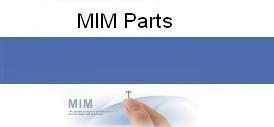A two-material Metal
Injection Molding automotive component wins 2016 EPMA award
9th Dec, 2016
The European Powder Metallurgy Association (EPMA) organised its 2016
Powder Metallurgy Component Awards to coincide with the World PM2016
Congress & Exhibition, Hamburg, October 9–13, 2016. These awards were
open to members of the association who manufacture components made by
conventional Powder Metallurgy, Metal Injection Molding, Hot Isostatic
Pressing and Additive Manufacturing. The winners were presented with
their awards during the event’s opening Plenary Session.
Metal Injection Molding featured prominently in the overall list of
competition entries, however it was a two-material (2C) MIM automotive
component that won the award in the MIM category. Developed by Schunk
Sintermetalltechnik GmbH, the 2C-pin is the first serial part worldwide
produced by the Metal Injection Molding of two different materials, in
this case 316L stainless steel and the cobalt-base alloy Stellite 12.
By using this cutting edge MIM technology it was stated that a critical
customer problem was solved, namely combining wear resistance in a wide
range of temperatures with weldability in one complex part. The
challenge and innovation was to modify two different alloys to get close
to the same sintering behaviour. Cracks are therefore avoided and a
continuous gradient in chemical composition can be achieved between the
two components instead of an abrupt joining zone. The judges stated that
Schunk has opened a new area for MIM applications with this technology,
with the promise of significant growth potential. The part has densities
that range from >7.6 to >8.2 g/ cm3. Tensile strength was reported as
ranging from >500 to >1000 N/mm², Yield Strength ranges from >200 to
>900 N/mm², Product Hardness ranges from 120-180 HV to 440-540 HV and
Elongation was stated as ranging from >50 to >2.

A two-material (2C) MIM automotive component

